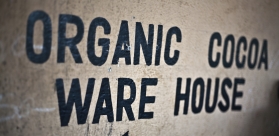User login

Academic publications | environmental policies
In 1992 the leaders of the world came together at the first Rio Earth summit, historically acknowledging the imperative of a needs based approach to sustainable development. Although agenda 21 and the Rio Declaration made a call upon all citizens of the world to play a role in ensuring...
The Democratic Republic of the Congo (DRC) accounts for the largest part of the Congo Basin forest: two-thirds (some 155 million hectares) are forested and 69 percent of which is dense humid forest. With a surge in world market commodity prices for cocoa in 2008 and a steady 2-5% annual increase...
The fermentation of cocoa pulp is one of the few remaining large-scale spontaneous microbial processes in today’s food industry. The microbiota involved in cocoa pulp fermentations is complex and variable, which leads to inconsistent production efficiency and cocoa quality. Despite intensive...
Cocoa farmers can make an important contribution to the preservation of biodiversity. Areas where cocoa is produced can for example act as a buffer for – or corridor between – nature reserves. Farmers do not receive a reward for such ecosystem services, however. This is a missed opportunity....
The interaction of climate change and poor housing quality in Nigeria’s rural areas portends serious impact on health status. This study analyzed the effects of climate change vulnerability and housing quality on the health status of cocoa farmers. The data were collected using multi-stage...
The study assessed the perception of farmers on the awareness, causes and impact of climate change on their farming activities. The study further identifies and describes the various coping strategies adopted by farmers
and ways of improving upon them to effectively tackle change in...
The use of citric acid as an extractant could boost the industrial recovery of pectin from waste cocoa husks that are generated during cocoa production, say researchers. In this research, different extraction conditions were applied to investigate the effect of temperature, extraction time and...
In a joint effort, International Food Policy and Research Institute (IFPRI) and the CGIAR Research Program on Climate Change, Agriculture and Food Security (CCAFS), have developed the West African Agriculture and Climate Change monographs. It is the first of three monographs on climate change...
Indonesia is the third largest greenhouse gas emitter worldwide due to land use change and deforestation. On the island of Sulawesi in the vicinity of the Lore Lindu National Park (LLNP), many smallholders contribute to conversion processes at the forest margin as a result of the expansion of...
In addition to exporting raw cocoa beans, Ghana also processes some of its beans into finished and semi-finished cocoa products for both the local and international markets. This paper aims at providing a comprehensive picture of the environmental impacts associated with cocoa production and...



